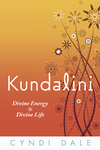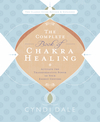Everyday Kundalini: Divine Energy, Divine Light

A few years ago, my son asked me what was wrong.
"Nothing much," I replied. "I'm just tired."
Michael looked at me in shock before shaking his head.
"Why don't you just put in a new battery, like they do on television?" (I think he was confusing me with the Energizer Bunny® because we both wear a lot of pink.)
If only life were that easy. Envision a world in which exhaustion, overwork, heartbreak, illness, or even a down day could be solved as easily as we insert a battery into a toy. Imagine how many dreams would become reality, and wishes, celebrations, if a renewable source of energy really existed, battery-operated pack or not.
Well there is a reservoir of personal power and it is available to each of us, especially if we know how to call, cultivate, and create with it. It might not perform as miraculously as an Energizer® battery, but it's the source of spiritual, as well as everyday, miracles. This force is called "kundalini."
Kundalini is known worldwide by a variety of names. Certain of these labels speak to its body-based nature, including prana, chi, orgone, and mana, descriptions for life energy. From a purely scientific perspective, kundalini is an electrical energy, vital because electricity is the basis of all cellular activity. Electricity and its resulting magnetic fields both fuel and protect our physical bodies, assuring good health and well-being. Other terms associated with kundalini affirm its spiritual attributes. What the Hindus call "Kundalini" (with a capital "K") is titled Tumo in Tibet, Quetzalcoatl among the Mayans, Hieron Osteon in Greece, Ruah within the Judaic faith, the Holy Spirit in Christianity, and Al-Lat or Salaat in Islam.
By whatever name, the important point is that kundalini is a divine light with physical properties, innate to us all. It nourishes our bodies but is also responsible for the achievement of enlightenment, the state of self-realization. This sacred energy really is a little like a battery, but we must "plug in" to benefit from its verve and dynamism.
Most cultures relate to kundalini as feminine, depicting it visually as a snake coiled at the base of the spine. Life is relatively peaceful, if not a little dreary, when the serpent sleeps, but when awake? As it rises? That's an entirely different matter.
Not to scare you, but think about what it feels like to have a snake crawling up your spine, stopping every so often to bite or engulf whatever lies in its way. This is the path, the challenge, and the promise, of kundalini. Kundalini purges and purifies, freeing us from anything preventing us from being and expressing our real selves.
Energetically, kundalini flows upward through a myriad of nadis, energy channels comparable to, and some believe identical to, the meridians depicted in Traditional Chinese Medicine, always returning to the spine. During its journey, it stops at several weigh stations, chakras or energy centers that each reflects specific physical, emotional, mental, and spiritual concerns. Your kundalini will quickly pass through your chakras if everything is in order, but we are human, after all. Most of us have at least a couple of clogged or injured chakras and must work through the entrenched physical maladies, repressed emotions, negative beliefs, spiritual misperceptions, and psychological hurts. In addition, we must release energies we've taken on from others, as we cannot heal issues not our own.
Kundalini doesn't "sting" to cause further injury. Rather, it is a clearing, healing force. Anything that prevents us from enlightening the world with our true self must be cleansed and transformed. Unfortunately, this process can sometimes cause stress, as many individuals who have undergone a kundalini experience can testify to.
I worked with one client who shook for three years after his kundalini stirred physical traumas from a childhood car accident. Yet another client cried for several days when her kundalini awakened memories of sexual abuse. Still others, however, reported gentler arousals, such as an ever-increasing sense of subtle peace, the opening of unacknowledged spiritual gifts, and a loving stir of sexual desire.
In my book, Kundalini: Divine Energy, Divine Light, I encourage readers to cultivate their kundalini before it arouses through an adherence to healthy living habits, responsible sexual practices, and therapeutic honesty. Yoga, prayer, meditation, and deep breathing are also useful, as is encouraging a personal relationship with the Divine. These practices are always helpful, even if your kundalini is already thrashing or has previously risen.
I also point out that men and women often respond differently to a kundalini awakening. There are masculine and feminine chakras. The kundalini tends to illuminate more issues in men in their male chakras, which includes the first chakra (passion and safety); the third (mental and structure); the fifth (communication and guidance); and the seventh (spirituality and purpose). I work with a twelve-chakra system that includes chakras located out of the body. The additional masculine chakras are the ninth (harmony and global unity); and the eleventh (commanding and leadership.) The masculine chakras tend to be more primal and physical than the feminine ones, which means that sometimes men react to the kundalini as if shocked by a high-voltage wire.
Women tend to sense the kundalini stronger in their female chakras. According to my twelve-chakra system, the feminine chakras are the second (creativity and emotions); fourth (love and relationship), sixth (vision and hormones), the eighth (shamanism and karma); and the tenth (nature and heritage.) The twelfth chakra is both masculine and feminine and contains our unique spiritual attributes. Baseline, the kundalini often stimulates emotional, relational, and mystical issues in women.
Of course, the kundalini will agitate blocks in any chakra, regardless of our gender, if by doing so it will call forth our sacred self. This, then, is the promise of a mature kundalini: oneness within, as well as oneness with the Holy One.
Whether you want to promote a gentle kundalini arousal, calm an inflamed kundalini, or embrace the beautiful affects of an already-risen kundalini, there is a simple exercise that can accomplish these and any other kundalini goals. It is to employ what I call the radiant kundalini, one of the three main types of kundalini I perceive in the body.
I encourage the use of three kundalini energies. We've been talking about the most well known kundalini, the red serpent kundalini. In addition, we can foster the golden kundalini, a spiritual nectar that enters our top chakras from the heavens. Also available is the radiant kundalini, a universal, living light housed in the center of each chakra.
To activate the radiant kundalini is to ignite our ever-present connection with the Divine. You can open this source of inner peace during any phase of a kundalini awakening, and by doing so, often transcend the most challenging side effects of the red serpent kundalini. In fact, you might want to take a moment now to enable your own radiant kundalini, starting by focusing on the center of your heart chakra.
Can you perceive the light of the Divine, swirling within? Here dwells the Greater Spirit, as well as your own immortal spirit. By experiencing your eternal oneness with the divine, you give permission to spark your radiant kundalini, the expression of unconditional grace. Experience this kundalini as it ripples from your heart chakra and then catalyzes the radiant center of all other chakras. Soon, you find yourself bathed completely in this glowing light.
The red (and golden) kundalini in your system now naturally folds into your radiant kundalini, which transmute toxins, negativity, and all energies that no longer serve you, so that you can truly and completely reflect the self that you already are, as well as the self you are becoming. As you surrender to this healing process, remind yourself that what is emerging has always been present. Just as the mighty oak is incumbent in the acorn, so is your spiritual essence present in your everyday being, kundalini energizing both your humanity and divinity.

About Cyndi Dale
Related Products


is subject to certain Terms and Conditions